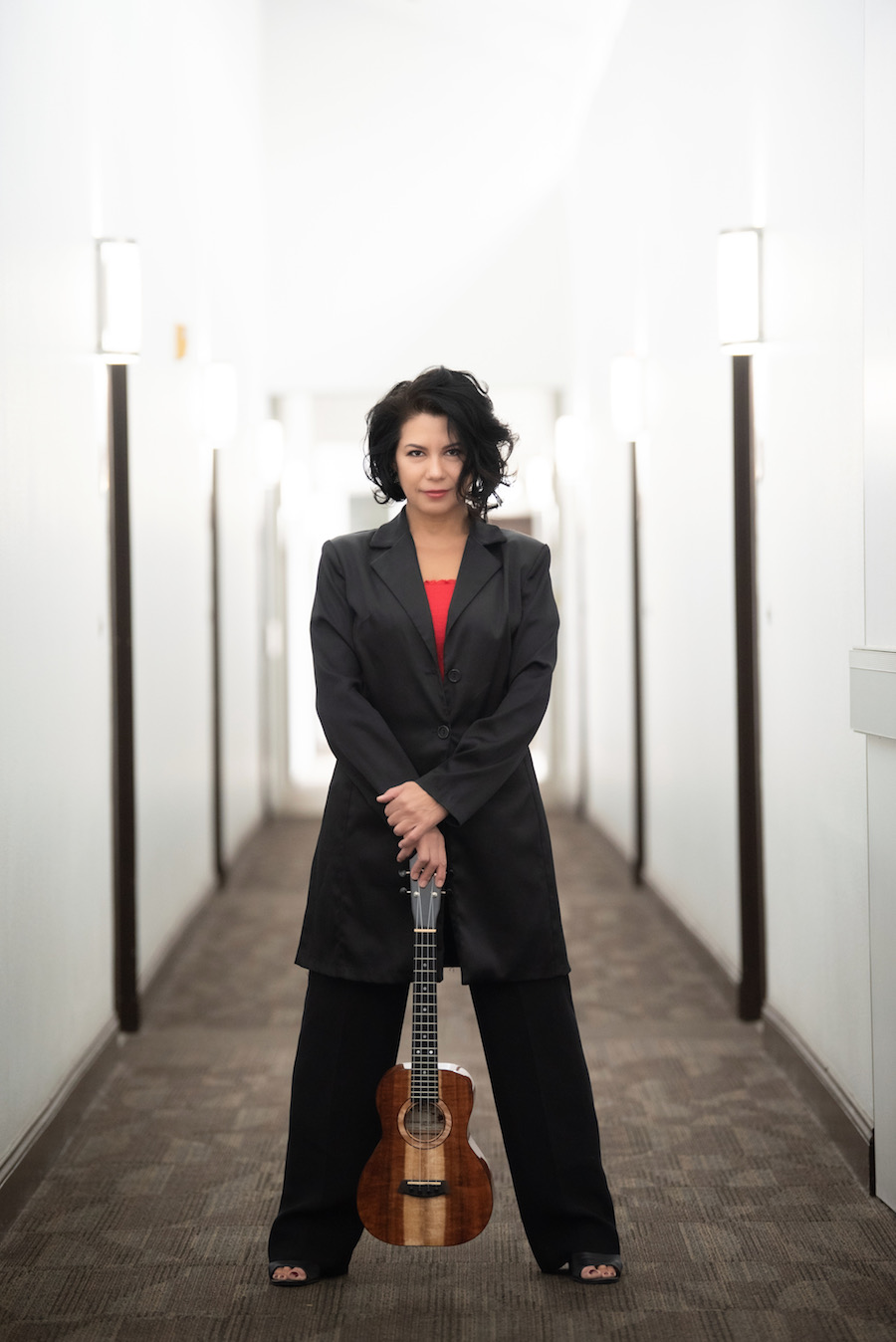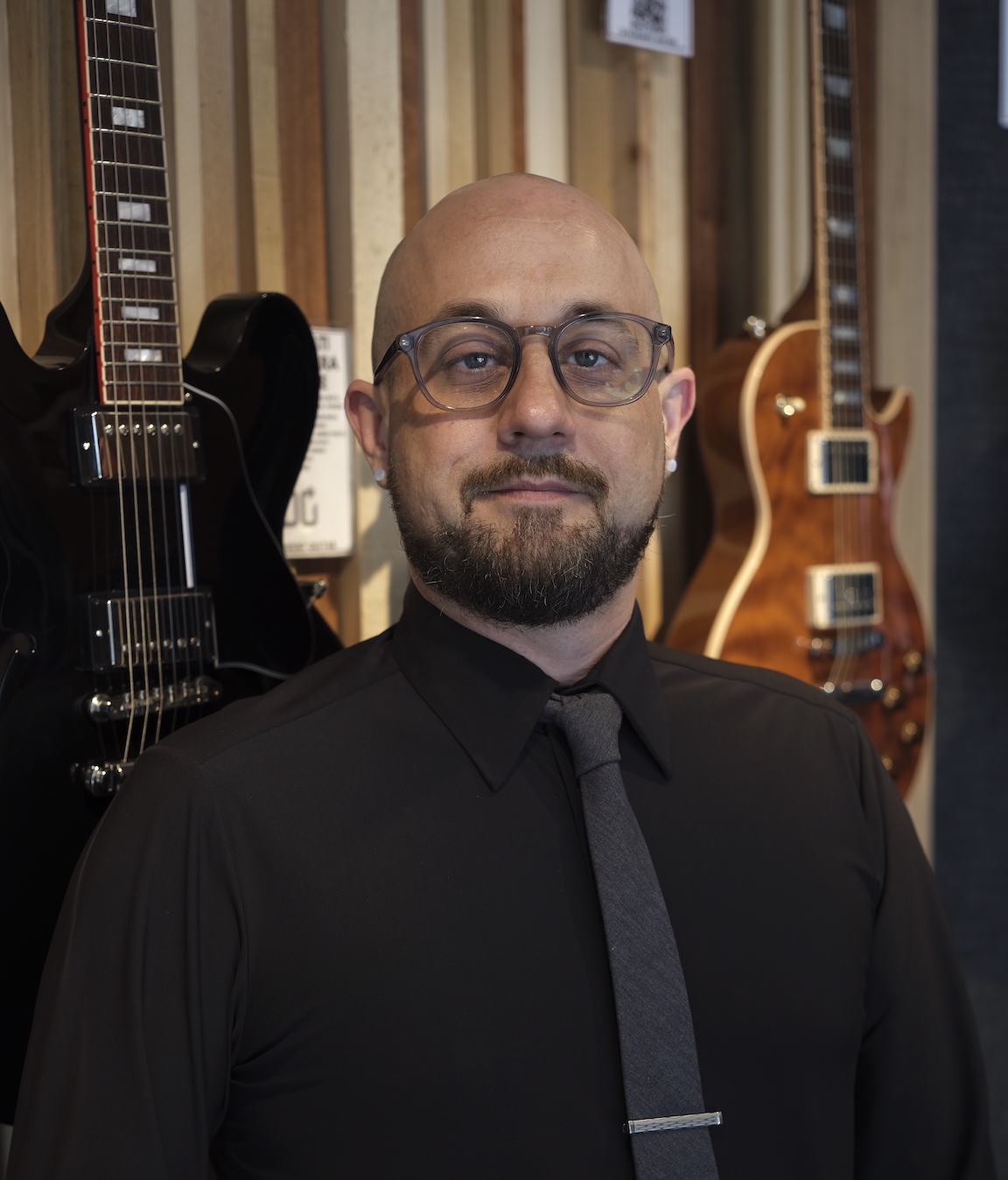
Robin Sassi
Like many MI retailers, Robin Sassi founded her music store, San Diego Music Studio, out of her apartment. It was 1994, and starting a music business was a natural evolution from her in-home teaching operation. But unlike most MI retailers, Sassi is also a practicing business lawyer, the daughter of a Filipino immigrant, a mother to two daughters, and the founder of the Philippines Ukulele Project, which connects donors with at-risk children in impoverished areas.
Also, Robin Sassi is a female music store owner.
Sassi runs San Diego Music Studio alongside long-time employee Kimberly Deverell, who joined in 1996 and serves as director of educational development and advocacy. Sassi had been determined to bring the importance of music to her community through the San Marcos, California-based dealership, which offers rentals, lessons and repairs and stocks a wide range of ukuleles, guitars, keyboards, print music, B&O accessories and more.
“Those with any business inclination will gravitate towards selling products associated with a service they provide,” Sassi said. “San Diego Music Studio increased its retail impression over time, starting with sheet music and supplies for its students. We began renting instruments, which led us to becoming one of the best repair facilities in San Diego.”
Today, Sassi continues to teach piano, alongside 16 teachers who instruct roughly 250 students on guitar, piano, band and orchestral instruments.
Sassi said she believes it’s important for young women to see other women teaching music.
“The young women in our studio are often inspired when seeing a woman in a leadership position or playing an instrument that has often been assigned to men,” she explained. “From a child’s perspective, it’s motivating when they see someone similar in gender or ethnicity. A child can imagine themselves in the future and see themselves in that context. It is important to note, however, that it’s vital for any child to see their adult counterparts engage in instruments and jobs that have been traditionally favored by any certain gender.”
Sassi also said practicing law (she graduated law school in 2010 and passed the bar the same year) has impacted the way she runs her MI dealership in several ways.
“There are mechanics to specific business practices that are easier to understand after a rigorous legal education,” Sassi said. “Having an in-house resource for legal issues and contract review is invaluable. Most importantly, being a business lawyer has shaped how I perceive the industry and how I gauge prospects and challenges.”
Sassi said during her first five years practicing law, she worked extensively in trials, appeals and business negotiations.
“I’ve been principal on stock transfer agreements, business formation and reformation, corporate governance, and a wide variety of business law issues,” she explained. “Today, I spend more time with a select group of long-term business clients and offer pro-bono services to underserved members of our community who are experiencing high-conflict issues.”
While today one in three attorneys are female, women in MI showrooms still continues to be a uncommon. Sassi said more women working the show floor of MI dealerships is critical for the growth of the industry as a whole.
“Having a woman at the MI table is crucial for remaining relevant and profitable for any business,” Sassi said. “Different perspectives in the [manufacturer’s] boardroom or retail [showroom] are indispensable. Women have tremendous purchasing power and a robust social network. These attributes give companies an edge against competition because they allow other potential avenues for growth in an increasingly competitive environment.”
She also noted the record number of women pursuing advanced degrees.
“More and more women are running MI businesses solo and are being promoted to C-level positions in legacy companies,” Sassi said. “The visibility and leadership roles show that MI is progressive and values diversity within its culture.”
Sassi added women’s roles and visibility in MI have “drastically evolved over the years.”
“In the past, a stereotypical retail music store would consist of a husband-and-wife team whereby the husband was the face of the business, and the wife balanced the books and ran purchasing,” she explained. “Of course, there were exceptions. A woman leading is no longer a rarity.”
Fostering A Shift
One example of this change in business dynamic can be observed at Heid Music, a five-location, full-line dealer based in Appleton, Wisconsin.
DeDe Heid, who serves as company president, works alongside husband Todd Heid, and said her store is continuing to see more women join the team.
“It’s exciting to see more women in MI and [see them] taking on leadership roles, as well as roles that were more male dominated, such as in repair,” Heid said. “At Heid Music, we have women on our management team, two female luthiers, two women who serve as road reps and multiple women in sales roles.”
To continue to increase the female footprint in the music products industry, Heid — along with West Music CEO Robin Walenta and Gator Cases CEO Crystal Morris — founded Smart Women in Music, or SWIM, in 2018. A NAMM-recognized organization, SWIM is dedicated to connecting, supporting and growing women in the musical instrument industry.
“The music industry is a special space, but it has been heavily dominated with white males in leadership positions,” Heid said. “We desired to provide a more well-rounded industry that holds up to the statement of being a universal language. We need to increase the awareness and value around what it means to be inclusive. We cannot just ‘check a box,’ we need to see the purpose and be intentional. SWIM was created to help shed light on the value of investing in a diverse and inclusive culture.”
With that goal in mind, SWIM is focused on working to develop and retain female talent within the MI industry by offering mentorship experiences as well as scholarships to NAMM shows so women inside and outside the industry can experience first-hand networking opportunities and all the industry has to offer.
“[We are focused] on creating a space for positive conversation to further develop individuals, businesses and our incredible industry,” Heid said. “We want to be able to make the next decades even better.”
Natalie Morrison, who serves as PR strategist for D’Addario, has been an active member of SWIM since its inception and runs SWIM’s podcast, SWIM Masters, with Stephanie Lamond.
“I always knew I wanted to be more involved, so when the pandemic first hit, and we all were in lockdown, I pitched an idea to Stephanie about using this time to launch a podcast to keep women in our industry connected virtually,” she explained. “As a result, we launched SWIM Masters in June 2020 to create a place where people can learn first hand about their colleagues, their career journeys, the uncomfortable hard-hitting topics we need to address and what they hope to see in our industry’s future. Since the launch, we have interviewed 26 inspiring women. We are putting out episodes once a month now, and you can listen on any major streaming platform.”
Who Runs The World?
When Zildjian CEO Craigie Zildjian joined the MI industry in 1976, organizations like SWIM, Women’s International Music Network or Women in Music had not yet been formed. Over the last 42 years, Craigie said she’s seen a change.
“For example, Robin Walenta became the first female to be elected the NAMM board chair in its [then] 116-year history,” she said. “There was a day when the entire NAMM Board was comprised of white males, and no one felt that was a problem.”
Craigie took over the company in 1997, a decision her sister Debbie, who served as senior vice president of human resources until just recently, said was originally not understood by many in the industry.
“When my father first passed the reins over to Craigie, many people viewed his decision with skepticism, even though this was a well-planned succession,” explained Debbie, who’s been working in the industry herself since 1980. “In addition to gender bias, there was a cultural bias, as many international companies had never considered a woman being CEO.”
Twenty-five years later, under Craigie’s tutelage, Zildjian has become a major player in not only the drum market, but the industry as a whole, with acquisitions of Vic Firth in 2010 and Balter Mallets in 2018. Craigie said she believes women offer a different leadership style, one that can lead to greater creativity and, in turn, a stronger bottom line.
“There have been a number of studies [that] demonstrate that diverse organizations make better decisions [that] result in increased innovation and a more profitable bottom line,” Craigie said. “But, beyond that, gender diversity improves a company’s culture and provides a better employee experience. Today, younger people, like millennials, are looking for a more diverse workplace. So, to attract top talent, businesses need to demonstrate that they embrace diversity, and not just gender diversity.”
“Women have shown that they can lead using a different and more modern leadership style, one that is less traditional and often more empathetic,” she continued. “While men are more likely to use the power that comes from their position of authority, women are more apt to rely on their interpersonal skills. More specifically, women tend to foster collaboration, sharing power and information, and finding ways for employees to contribute. This more inclusive management style allows employees to feel more a part of the organization, leading to increased job satisfaction and morale.”
Debbie’s daughter and Craigie’s niece, Cady Zildjian, joined the family company a few years ago, and, last year, was appointed vice chair of the company’s board of directors. After working outside the industry for a couple years, Cady said she sees women bring a certain “color” to the percussion industry.
“I think women bring a lot of color and energy to a conversation that is traditionally male-dominated,” Cady said. “The female perspective tends to be long-term focused — something that is key to a successful family business.”
Tapping Into Experience
Melissa Ceo, who serves as business development manager at C.A. House of Music based in St. Clairsville, Ohio, said she doesn’t believe the MI industry presents challenges based on gender.
“I have always felt that the music industry was more inclusive to me than other industries I’ve worked — namely, the hospitality industry,” she explained, adding that she believes women bring their own set of individual skills and strengths. “As a rule, I’ve always tried to avoid assigning general attributes of strengths or weaknesses based on sex. Diversity is incredibly important in any industry, because with diversity comes a wide variety of perspectives and experiences.”
One example can be found at Mike Risko Music in Ossining, New York, where co-owner Miriam Risko has used her experience and passion for design and fashion to open the Rockstar Boutique.
“We often saw people stopping by the store that wanted to buy a gift, but they weren’t a musician and the person they were buying for wasn’t necessarily a musician, so I had the idea to start stocking rock T-shirts, jewelry, bags and books that would appeal to musicians and music fans alike,” Risko said. “It’s been great because it’s allowed us to cross that line into another market. It’s going to open a lot of doors for us, retail-wise.”
The Importance Of Representation In MI
An October 2018 survey conducted by Fender found that 50% of all beginner guitarists were female. As those beginning musicians enter music showrooms, just like the young women that entered Robin Sassi’s lesson studio, they will no doubt look for women they can identify with.
“If you don’t see people that you identify with — whether that’s in a guitar store, at NAMM or in the comment section online — you don’t feel as welcome,” said Kristen Cho, chief marketing officer at Reverb.
Cho said one actionable step Reverb has taken over the past few years is to be intentional about representation in the online retailer’s content when featuring people — from interviews and educational pieces to historical deep dives and more.
Moya Nkruma, artist marketing manager for Fender, said if she had seen more women who look like her playing guitar, she would have started sooner.
“Seeing yourself in these spaces, including music store showrooms, is inspirational and allows us to dream of the possibilities,” Nkruma said. “As a black woman, if I had seen a photo of an artist like H.E.R. with her own signature guitar at a music store, I would have picked up the guitar a long time ago.”
A Word To Future Generations
In the recording side of music industry, the number of females pales in comparison to men, with a 2020 study conducted by the University of Southern California from 2012 to 2020 showing that women comprised a total of just 21% of all artists, 12% of all songwriters and 2% of all producers.
Equal representation starts with getting more women introduced to MI. Opportunities like SWIM’s NAMM Show scholarship program, the two-day SWIM leadership symposium and Women in Music’s career development seminars help move the dial. For those looking to get into the industry, Zildjian’s Craigie Zildjian suggested women consider finding a mentor.
“Mentorships can accelerate one’s skill development and career advancement,” she said, adding that training programs, such as internships, are key. “Be advised that it’s highly likely you will run into gender bias. Remember to not allow someone’s prejudice to discourage you or [make you] lose confidence in your abilities.”
For those already in the industry, C.A. House of Music’s Melissa Ceo stressed the importance of networking.
“Work hard, play to your strengths and network,” Ceo said. “I cannot overstate the [importance of] networking enough. Connecting with others not only creates opportunities, it also enhances your experiences in the industry. My involvement with NAMM Young Professionals is invaluable and has helped me create a support network that enhances every aspect of my life.”
For all women looking to further their roles in the industry and continue to shatter glass ceilings, Robin Sassi put it best.
“I would tell any young woman starting in MI to pursue what you love. Bring your voice to the table. Don’t wait to be offered a job, a raise or a position. Ask,” Sassi said. “Contrasting frames of reference enable decision-makers to weigh solutions and clarify strategy. Voicing an alternative viewpoint brings challenging dialogue to business discussions. Be that voice.” MI













